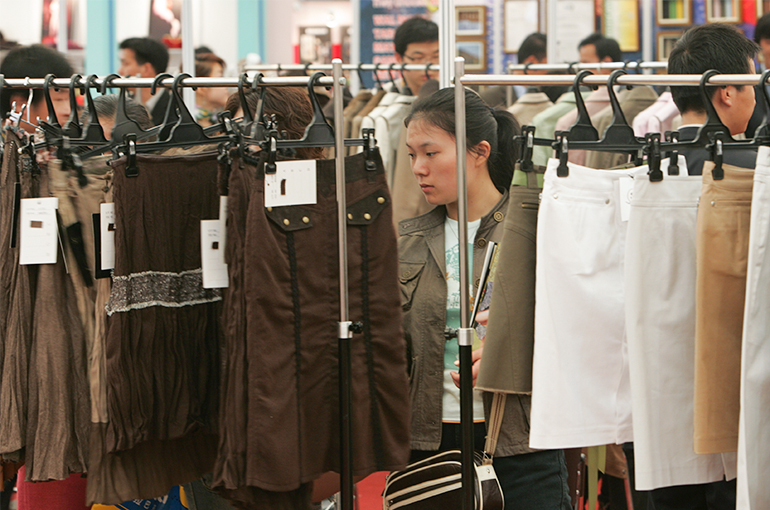 Chinese Fashion Retailers Adjust to Slower Economic Growth
Chinese Fashion Retailers Adjust to Slower Economic Growth(Yicai) Sept. 6 -- China’s economic growth slowdown has brought significant pressure on the local fashion retail industry, which is now actively promoting adjustments.
Fashion retailers struggled in the first half of the year, Yicai learned from sources. Many small- and medium-sized businesses shut down or struggled to maintain stable operations, while only some large clothing chains improved their performances.
Retail sales of garments rose 0.8 percent to CNY515.6 billion (USD72.8 billion) in the first half from a year earlier, down from a 15.5 percent growth a year earlier, according to data from the National Bureau of Statistics.
Li Ning changed its main goal of this year to “steady operation and pragmatic development” from “scale growth,” Qian Wei, the Chinese sportswear giant’s co-chief executive officer, said at the company’s semiannual earnings conference call.
Uniqlo plans to close loss-making stores in China in the next two to three years to focus on stores in prime locations, said Pan Ning, CEO of the Japanese apparel firm’s Chinese arm. Against the backdrop of new market conditions, consumers no longer prefer branded products, as they are more willing to choose affordable options, Pan added.
The owner of a clothing store in Shanghai told Yicai that she closed her offline outlet in July when the rent contract expired because sales were sluggish for a while. She shut down her store on e-commerce platform Taobao at the end of last year.
“When I opened the store about 10 years ago, clients were ready to pay over CNY1,000 (USD141) for a piece of clothing,” the former shop owner said. “Moreover, customers decided to buy garments very quickly.”
High-price clothes have been hard to sell, and online prices have been continuously declining in recent years because customers mainly focus on cost-effectiveness, she added. “My Taobao store was getting less and less traffic because I did not participate in promotions.”
However, some classic clothing brands with solid foundations are still seeking opportunities in some popular market segments, such as outdoor sporting clothes.
For example, Metersbonwe expanded the focus of its Meibang brand to outdoor clothing after noting the increased popularity of outdoor sports, founder Zhou Chengjian said. The company provides customers with “luxury products at affordable prices,” Zhou noted.
Semir accelerated its overseas market expansion. It opened seven stores of its children’s clothing brand Balabala in Vietnam and landed on Southeast Asian e-commerce platform Shopee in the first half of the year.
According to Semir’s semiannual financial statement, the gross profit margin of the firm’s overseas business was nearly 70 percent, much higher than that from the domestic business, while sale and net profit growth were also quite impressive over there.
Editors: Tang Shihua, Futura Costaglione